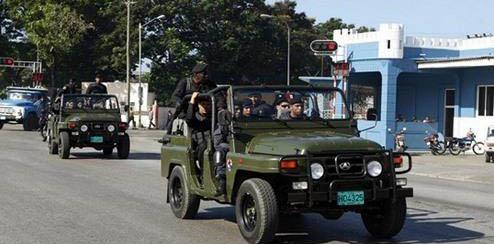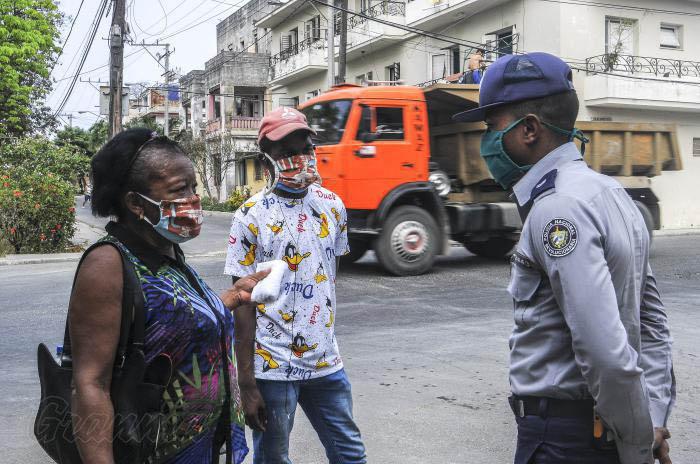
If there is one thing that has been seen consistently on social media during these months - with all the psychological pressures imposed by COVID-19, even as the fears and uncertainties of the pandemic’s early days have diminished, along with media and political exploitation of these sentiments - it is the permanent campaign to tarnish the image of the police in Cuba.
Although photos and videos of any negatively perceived action by officers of the National Revolutionary Police (PNR) are a regular part of the content with which digital media in Miami flood Cuban internet users, the recent bombardment has become practically a daily phenomenon. It has been almost impossible for the average user of social media in Cuba to escape them.
The well-greased and funded machine will use any graphic content that serves the purpose, along with any other item that could generate concern about life in the country. The material published by some of these digital sites is immediately replicated by similar websites, if they had not received the content directly. Publishers are permanently on the lookout for anything posted on social media, especially Facebook, that could be useful.
Firm measures that require maximum social discipline are needed to contain the COVID-19 epidemic, including isolation, and authorities are in charge of enforcing these measures. Their work has included the application of fines, a fairly common practice, especially in developed countries.
The situation demanded the mobilization not only of the police in their usual uniforms, numbered to guarantee identification, but also of extra personnel from various branches of the armed forces, who took on the difficult task of dealing with the population on the streets. This, added to the tension generated by the spread of the new coronavirus, providing a scenario that these digital media considered ideal for their purposes. Each announced measure was accompanied by a headline designed to generate apprehension, along with a photo showing a patrol car, NPR officers, or simply someone in uniform.

The anti-Cuban media agenda expanded as lines at the stores increased. All kinds of stories, real or not, about allegedly unjustified fines, mistreatment and abuses of authority, with or without graphic accompaniment, were circulated with great emotion, meant to provoke indignation in those who read them.
The machinery, in an obviously forced and even absurd way, has attempted in vain to connect the indignation produced by police brutality in the United States, to the occurrence of lamentable, statistically rare events in Cuban, like that recently took place in Calabazar and Guanabacoa.
All of our intellectual capacity must be mustered to avoid falling victim to this current offensive, which seeks to artificially sow fear and rejection of the police, based on no personal experience - which can be very diverse - but rather, as a result of the emotional impact of those media posts. The aim of this campaign is to twist opinions based on lived experience, and replace them with one based on the image manufactured by the communicational experience, the one fabricated by this machinery.
The cultural level of every person is an important element. Someone with little knowledge of how these kinds of montages work, with little critical sense, is more vulnerable to manipulation by these contents and more likely to assimilate and further disseminate them.
Nor should we see this phenomenon as isolated, separated from the higher political objectives for which these media forces created to attack and undermine Cuba’s social system. In his book Manipulation of Consciousness, Russian intellectual Sergei Kara-Murza analyzed this media strategy used to turn the population against the Soviet police, during the process of destroying the USSR, in the late 1980s and the beginning of the 90s: "An important sphere of social consciousness involves relations between the people and the state, perceived in their usual, personal form, such as the people's relations with the police. The symbol of the guardian of order is one of the main objects of ideology, which, if aimed at strengthening the state, shapes a favorable image in consciousness... If an ideology seeks to destroy the state, it creates a dark myth about the police.”
Thus, the production of contents by Cuban media outlets to expose these enemy intentions is essential, while abandoning the effort or responding inadequately could leave a costly void.
The television program Hacemos Cuba, after receiving numerous comments from citizens requesting information on the subject, recently clarified that it is absolutely legal to photograph or record a police officer during the completion of his or her public duties. Such graphic evidence can be used in filing a complaint, thus any officer attempting to stop this, in any way, could be guilty of abusing his or her authority.
The publication of such a photograph on social media is another thing altogether, since the right of the police officer to have his or her personal image respected must be considered, as well as the intention behind such digital dissemination.
Most viewers found this response satisfactory, as it clarifies what has been the cause of some unpleasant interactions between law enforcement officers and citizens. The importance of knowledge of the law on the part of those responsible for enforcing it was highlighted. Particularly at a time there are more and more Cubans with cell phones and Internet access, it is urgent necessary that both police and citizens have this knowledge.
When the program was broadcast, its content received no coverage in the corporate press, but several digital media in Miami immediately began to distort the information. It will never be in the interest of this machinery to make citizens fully aware of the law, or of the institutional channels through which they can communicate and assert their rights. Thus disseminating this information as widely as possible is totally counterproductive as far as they are concerned.
There is no police force in any country around the world that is capable of reaching maximum perfection in their work. Every force of order is composed of human beings who, in turn, exercise their authority over others in the most dissimilar situations. In the case of Cuba, the social, regional and migratory complexities that influence police work are well known. It has not been possible to avoid the movement of law enforcement officers from one province to another, to address staff shortages – to Havana especially - with the consequent impact, despite efforts made with the greatest intention, at the highest levels of leadership.
Nor is it a question of ignoring the problem, or being naive, but rather of being aware of the real occurrence of reprehensible acts, involving violence or corruption, the loss of ethics and professionalism, for which the NPR itself, the Ministry of the Interior and the Attorney General’s office have publicly known mechanisms to denounce such acts and seek redress.
At the beginning of COVID-19 epidemic, Argentine psychologist Monika Arredondo published an extract from her book La clase media argentina (The Argentine middle class) in the newspaper Página 12, in which she explains: "Climates of opinion become an optimal space for the propagation of hate, fear and social alarm. These images, continually multiplied and transmitted, displace all forms of rational thought, confirming and justifying certainty in the face of the suggested enemy... Fear is the fuel and the motor of their narratives in periods of domination and installation of neoliberal models. There is a media construction of the event, a sense, a direction that is confirmed in the banalization of vacuity and hyperreality".
As the country has successfully overcome the coronavirus, new issues are being fabricated to create discontent and fear among users on social media. This is the frustrated reaction of those who rubbed their hands with glee as they published headlines about chaos in Cuba - which was never seen. They have no choice but to continue the search and invent new themes to manipulate.
Seeing the pretension to equate the incomparable, the fatal result of an unfortunate, isolated police incident in Cuba and the brutal murder of George Floyd in the United States, or the recent circulation of images of the Berlin Wall next to one built around a complex of restaurants and services on Havana’s waterfront, one cannot help but think of how much "banalization and hyper-reality" there is in these ideas. But, especially, we must reflect on the intentions of the media that massively promote them. This is the real wall, the one they are attempting to build in our minds, with bricks of manipulation.















